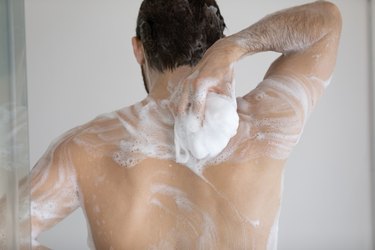
From chilly weather to certain medical conditions, there are many reasons why you might have dry skin after a shower. But there's one seemingly harmless hygiene habit that can unintentionally worsen your dry, flaky skin: soaping up your whole body when you bathe.
Yep, lathering every limb could be damaging your dermal layer, as it can strip your skin of essential moisture and increase dryness.
Video of the Day
Video of the Day
Here, we talk to dermatologists who explain why you should limit the lather and stick to sudsing up only certain body parts in the shower for supple, saturated skin.
Why Over-Washing Causes Dry Skin
"We are living in a society of over-washers," Joshua Zeichner, MD, director of cosmetic and clinical research in dermatology at Mount Sinai Hospital, tells LIVESTRONG.com. "While good hygiene is important, it is a new idea that we need to shower every day and use soap all over our bodies."
What's most essential is to bathe the body parts that get particularly funky. "It is important to remove any visible soiling from the skin and to cleanse dirty areas like the face, underarms and groin using a cleanser on a daily basis," Dr. Zeichner says.
Also be sure to clean underneath the breasts or other body folds. If you've been exercising, clean areas that have been sitting in wet clothes, like the back and chest.
However, water can suffice when washing most other areas. "This is especially true for patients who suffer from conditions like dry skin and eczema, where the skin barrier is already disrupted and overexposure to soap can actually impair its functioning," Dr. Zeichner says.
Still, this strategy may not be sufficient for some who are prone to skin infections and breakouts. For those folks, removing the dirt, oil and bacteria that accumulate throughout the day can help prevent clogged pores, acne and folliculitis, says Y. Claire Chang, MD, a board-certified dermatologist at Union Square Laser Dermatology.
More Showering Tips for Dry Skin
Here are a few more simple things you can do to avoid dry skin after showers:
1. Don’t Use Hot Water
"Our minds may like hot temperatures, but our skin does not — excessive exposure to hot water can strip the skin of essential oils and damage the outer skin layer," Dr. Zeichner says.
So, stick to lukewarm temps. "The temperature of the water should be around what you would expect a heated pool to feel like in the summertime, between 86 and 88 degrees Fahrenheit," he says.
2. Limit Showers to 10 Minutes or Less
"Long, hot showers can further dry out your skin," Dr. Chang says, so keep your showers short.
3. Choose a Hydrating Soap
"True soaps have an alkaline pH, whereas the skin is naturally acidic," Dr. Zeichner says. But here's the thing: "Altering the skin's pH can interfere with the skin's ability to protect itself from the environment, which leads to dryness and irritation," he adds.
Dr. Chang agrees: "Avoid harsh soaps that contain alcohols and surfactants, which can strip away your skin's natural lipids and further dry out your skin."
She recommends washing with a gentle, fragrance-free, dye-free cleanser like CeraVe Hydrating Body Wash that contains ingredients like glycerin, hyaluronic acid and ceramides to help retain the skin's moisture.
Dove Sensitive Skin Body Wash, which contains ultra-gentle, non-soap cleansing ingredients along with hydrators found in traditional moisturizers, is another good pick for people with dry skin, Dr. Zeichner says.
As for cleansing your face, you'll want to be choosy there, too. The best face washes for dry skin are fragrance-free and made with gentle cleansing ingredients.
Expert-Recommended Body Washes for Dry Skin
4. Opt for Showers Over Baths
While bathing can soften the skin, Dr. Zeichner generally recommends showers to limit exposure to hot water.
Still, baths can be beneficial sometimes. "Therapeutic baths using additives like oatmeal serve a different role, providing the skin with active ingredients to calm, soothe and repair," he adds.
5. Gently Pat the Skin Dry
"Rubbing dry skin can weaken the skin barrier and cause irritation," Dr. Chang says. "Similarly, do not use scrubs, washcloths or loofahs, which can further irritate and inflame your skin." If you want to use a washcloth or loofah in limited areas, be sure to use it very gently.
6. Moisturize ASAP
"It is best to apply moisturizer within three minutes of showering to lock in the moisture," Dr. Chang says. She recommends using thicker eczema cream and ointment rather than lightweight lotions to stay hydrated and avoid making your eczema worse after showers.
Look for moisturizers with ingredients like jojoba oil, dimethicone, glycerin, hyaluronic acid, lactic acid, lanolin, mineral oil, petrolatum and shea butter, per the American Academy of Dermatology Association.
Moisturizers for Dry Skin
7. Shower With the Door Shut
"This can preserve the humidity in the air," Dr. Chang says, which can help you avoid dry skin after showers.
Is this an emergency? If you are experiencing serious medical symptoms, please see the National Library of Medicine’s list of signs you need emergency medical attention or call 911.